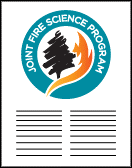United States Joint Fire Science Program

Joint Fire Science Program Research Project Reports
Document Type
Article
Date of this Version
2012
Citation
Final Report. JFSP Project Number: 09-1-9-2
Abstract
This study first summarized findings of fire prevention education statistical modeling from the State of Florida from a study originally led by the Principal Investigator and two major collaborators (Karen Abt, USDA Forest Service, and David T. Butry, National Institute of Standards and Technology). The study next measured the statistical effects of wildfire prevention programs occurring on tribal lands administered by the Bureau of Indian Affairs, with primary involvement of major collaborator Sam Scranton (Bureau of Indian Affairs). Using first a binary variable indicating the presence or absence of a wildfire prevention program on lands managed by the tribe or tribal grouping, the second activity revealed that fire prevention programs significantly reduce the occurrence of all categories of wildfires. The largest impacts of these programs are found for campfire escapes, arson, and children ignited wildfires. The overall average reduction in the number of wildfires due to the prevention programs is estimated to be up to 93%. Economic assessments of these impacts are still underway and will be completed as additional data becomes available. Estimates of the statistical effects of specific categories of prevention efforts are still under development and will be completed in the next six months.
Included in
Forest Biology Commons, Forest Management Commons, Natural Resources and Conservation Commons, Natural Resources Management and Policy Commons, Other Environmental Sciences Commons, Other Forestry and Forest Sciences Commons, Sustainability Commons, Wood Science and Pulp, Paper Technology Commons


Comments
US government work.